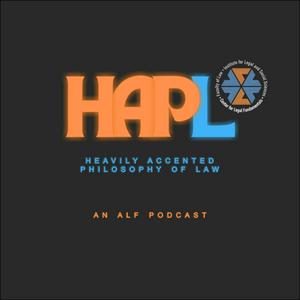Episode 10 - Experimental Jurisprudence (ft. Izabela Skoczeń)
In this episode, we delve into the debate about experimental jurisprudence (also known as xJur). What is exactly “experimental jurisprudence”? What is in turn “experimental philosophy”? What are the methods of xJur and what are the good practices in order to get replicable results? Can we truly achieve knowledge on law through experiments?Izabela Skoczeń discusses with us the raising in importance of experimental jurisprudence in the last years, how it fits within the underlying assumptions in philosophy and jurisprudence related to law, and the criticisms that have been formulated towards it. We explore first a general introduction to both experimental jurisprudence and experimental philosophy, as well as the array of methods used by the former and an overview of the applicable good practices. We then address some of the criticisms formulated towards xJur, arguing for the ecological validity of xjur, arguing why xjur is helpful, also when focused on non-expert understanding of concepts, and why a short scenario can shed light on complex conceptual issues. Finally, we close the episode exploring the role of xJur in conceptual analysis and the challenge of conflicting intuitions.Izabela Skoczeń is an assistant professor at the Law Faculty of the Jagiellonian University in Kraków, Poland. Her work focuses on the intersection of legal theory, experimental jurisprudence and philosophy of language.She is a member of the Jagiellonian Centre for Law, Language and Philosophy, a member of the editorial board of the Bloomsbury series ‘Advances in Experimental Philosophy’, and a contributing editor of the jurisprudence section of Jotwell. She is currently working on a project on devising principles for responsible LLM communication with partners from Austria, Romania and Switzerland: https://talkingtobots.net . She is also working on a project on cross-cultural replications of experimental jurisprudence studies, together with K Tobia and J L Nunes.She has published in Synthese (Renouncing the attempt versus perpetration distinction, 2023), Bloomsbury (chapter: From lying to blaming and perjury: deceptive implicatures in the courtroom and the materiality requirement, 2025), Cognition (Outcome effects, moral luck and hindsight bias, 2023, with M Kneer), the Leiden Journal of International Law (Inside the treaty interpreter’s mind: An experimental linguistic approach to international law, 2023, with B Pirker), Ratio Juris (Delimiting Legal Interpretation: The Problem of Moral Bias and Political Distortion—The Case of Criminal Intention, 2022, with F Poggi), the International Journal for the Semiotics of Law (Modelling Perjury: Between Trust and Blame, 2021), Oxford University Press (chapter: Is a Legal Implicature in the Eye of its Beholder?, 2022). She has authored a monograph, Implicatures within Legal Language, in 2019, in the Springer Law and Philosophy Library.Overviews of xJur work mentioned: Stanford Encyclopedia of Philosophy entry on experimental jurisprudence by K Tobia, G Almeida, K Prochownik and I HannikainenThe Cambridge Handbook of Experimental Jurisprudence ed by K TobiaOverview article by K TobiaOverview article by R SommersOverview article by K Prochownik[This episode was hosted by Julieta Rabanos and Bojan Spaić; edited by Bojan Spaić; uploaded and formatted by Julieta Rabanos](00:00:00) Intro HAPL(00:00:18) Introduction to the episode – hosts and guest(00:00:58) Izabela Skoczeń – Academic Genealogy and Research Interests(00:05:04) Experimental Jurisprudence (xJur) – What exactly is it?(00:12:32) xJur and Experimental Philosophy(00:27:49) An Underlying Assumption – does law deal with facts?(00:33:53) Methods of xJur & Replicability(00:45:54) Some Criticisms Formulated Towards xJur(00:54:42) xJur & Conceptual Analysis - The Challenge of conflicting intuitions(01:11:02) Farewell and last words(01:15:34) Outro HAPL


